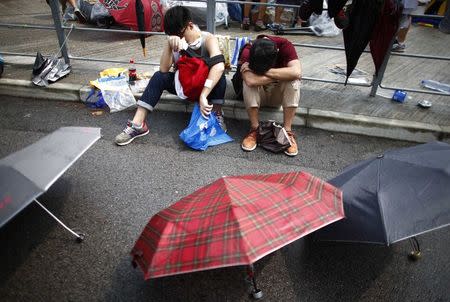For some Hong Kong residents, patience with protests wears thin

By Yimou Lee and Kinling Lo HONG KONG (Reuters) - Cracks are beginning to show in public support for Hong Kong's pro-democracy movement, as residents count the cost of a week of sometimes violent disruption to their lives at work and home. Some of those whose sympathy is wavering for the thousands of protesters occupying central parts of the city are in fact allied to their cause, agreeing with demands that Beijing stop meddling in Hong Kong's electoral process. Others have opposed the protests from the start, angry that people should be allowed to bring areas of Hong Kong to a standstill and affect not only individual livelihoods, but the city's global reputation. "We are all fed up and our lives are affected," said teacher Victor Ma, 42, speaking in the densely populated Mong Kok district where scuffles broke out between supporters and opponents of the protests on Friday. "You don't hold Hong Kong citizens hostage, because it's not going to work. That's why the crowd is very angry here." Those words will be music to the ears of Hong Kong's chief executive, Leung Chun-ying, who has rejected calls to resign and indicated he will wait it out to overcome the worst unrest since China resumed control of the former British colony in 1997. China rules Hong Kong through a "one country, two systems" formula underpinned by the Basic Law, which accords Hong Kong some autonomy and freedoms not enjoyed on the mainland and has universal suffrage as an eventual goal. But Beijing decreed on Aug. 31 it would vet candidates who want to run for chief executive at an election in 2017, angering democracy activists who have since taken to the streets. Student leaders who have been key to the success of the mass show of dissent are aware their supporters may tire of spending days, and in many cases, nights on the streets away from home. They are also concerned that Hong Kong residents not part of the movement will turn against them. NUMBERS DWINDLE, SCUFFLES BREAK OUT At Causeway Bay, a major shopping area occupied by thousands of demonstrators earlier this week, numbers had dwindled to fewer than 100 by Friday afternoon. A man holding a loudspeaker taunted those remaining as he walked past. "You can boycott classes, but my kids want to go to school!" he shouted. The man would not give his name, but said his two children were unable to go to school because classes had been cancelled on account of the protests. The crowd outside Leung's office also fell to hundreds on Friday from thousands the day before as the city went back to work after a two-day holiday. Demonstrators at one point prevented two trucks from delivering supplies for about 100 police guarding the office. Back in Mong Kok, Winnie, a store manager in her mid-30s, expressed support for the "Occupy Central" movement, but had her livelihood to worry about. "I'm very worried, of course. Our business is so bad. We may lose our bonuses," she said. Her salary is partly based on store sales. Trade, she added, had picked up in the last two days as the protests remained largely calm following violent clashes last weekend, but they were still only about half normal levels. "I hope the government could respond as soon as possible, otherwise I don't really know what to do." (Writing by Mike Collett-White; Editing by Ian Geoghegan)

